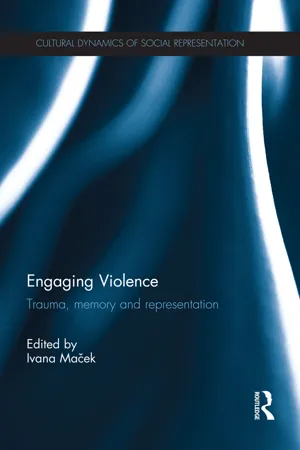
- 214 pages
- English
- ePUB (mobile friendly)
- Available on iOS & Android
About this book
This volume opens up new ground in the field of social representations research by focusing on contexts involving mass violence, rather than on relatively stable societies. Representations of violence are not only symbolic, but in the first place affective and bodily, especially when it comes to traumatic experiences. Exploring the responses of researchers, educators, students and practitioners to long-term engagement with this emotionally demanding material, the book considers how empathic knowledge can make working in this field more bearable and deepen our understanding of the Holocaust, genocide, war, and mass political violence.
Bringing together international contributors from a range of disciplines including anthropology, clinical psychology, history, history of ideas, religious studies, social psychology, and sociology, the book explores how scholars, students, and professionals engaged with violence deal with the inevitable emotional stresses and vicarious trauma they experience. Each chapter draws on personal histories, and many suggest new theoretical and methodological concepts to investigate emotional reactions to this material. The insights gained through these reflections can function protectively, enabling those who work in this field to handle adverse situations more effectively, and can yield valuable knowledge about violence itself, allowing researchers, teachers, and professionals to better understand their materials and collocutors.
Engaging Violence: Trauma, memory, and representation will be of key value to students, scholars, psychologists, humanitarian aid workers, UN personnel, policy makers, social workers, and others who are engaged, directly or indirectly, with mass political violence, war, or genocide.
Tools to learn more effectively

Saving Books

Keyword Search

Annotating Text

Listen to it instead
Information
Table of contents
- Cover
- Half Title
- Title Page
- Copyright Page
- Table of Contents
- List of contributors
- Preface and acknowledgements
- Series editor's introduction: Beyond representation: Listening to screaming silence
- Introduction: Engaging violence: Trauma, self-reflection and knowledge
- 1 To work with the history of the Holocaust
- 2 Life in the trenches: Hope in the midst of human tragedy
- 3 “Sometimes I just don't want to go on …”: Navigating personal and collective time and space in researching and remembering genocides
- 4 Identity and mutability in family stories about the Third Reich
- 5 The question of legitimacy in studying collective trauma
- 6 Intersectional traumatisation: The psychological impact of researching genocidal violence on researchers
- 7 Conducting fieldwork in Rwanda: Listening to silence and processing experiences of genocide
- 8 Research under duress: Resonance and distance in ethnographic fieldwork
- 9 Making involuntary choices, imagining genocide and recovering trust
- 10 Personal and research-related links to trauma
- 11 Vicarious traumatization in mass violence researchers: Origins and antidotes
- Index
Frequently asked questions
- Essential is ideal for learners and professionals who enjoy exploring a wide range of subjects. Access the Essential Library with 800,000+ trusted titles and best-sellers across business, personal growth, and the humanities. Includes unlimited reading time and Standard Read Aloud voice.
- Complete: Perfect for advanced learners and researchers needing full, unrestricted access. Unlock 1.4M+ books across hundreds of subjects, including academic and specialized titles. The Complete Plan also includes advanced features like Premium Read Aloud and Research Assistant.
Please note we cannot support devices running on iOS 13 and Android 7 or earlier. Learn more about using the app